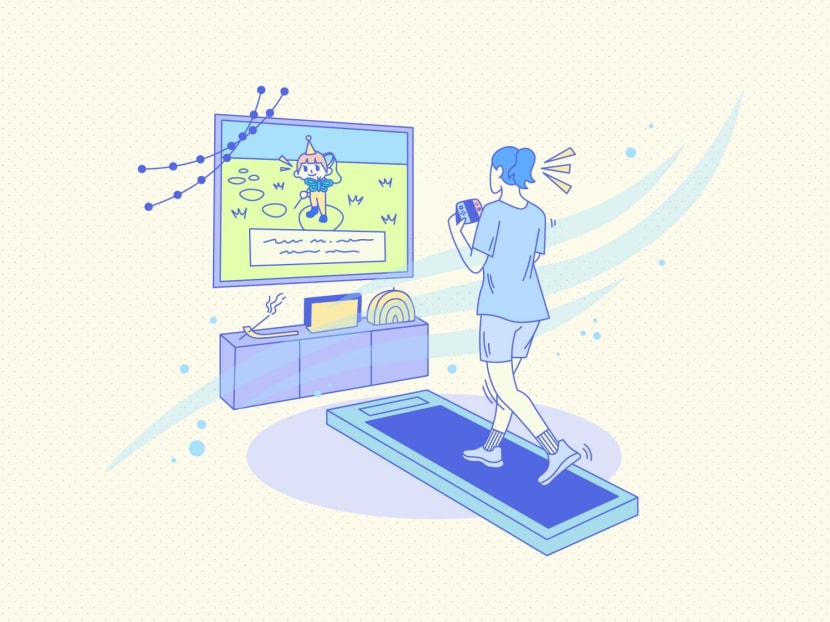Gen Zen: Slow down, get onboard the 'cosy' trend; it can boost your mental health

(Illustration: CNA/Nurjannah Suhaimi)
SINGAPORE — Tucked under covers and with a cup of warm tea by my side, I sink into the pixelated world of Stardew Valley on the Nintendo Switch. Here, deadlines and daily stresses melt away, and there is nothing to do but grow crops, mine, forage and raise livestock.
Stardew Valley belongs to a group of video games dubbed “cosy games”. In these games, players don’t need to save the princess or defeat the demon.
Games like Stardew Valley are part of the larger “cosy” trend, a cultural shift that has evolved beyond the stereotypical image of donning a comfy cardigan and listening to Taylor Swift’s album Folklore on repeat.
It has reframed how we view exercise in the form of “cozy cardio”, where walking at a slow pace is preferred to an intense HIIT class.
It has even found its way into books, most famously in Travis Baldree’s fantasy novel Legends and Lattes, where a mercenary decides to retire from her warrior life to open a coffee shop.
While the “cosy” trend was largely borne out of the pandemic, experts said it has persisted in the post-Covid-19 world as people see the value of slowing down.
“Gen Zs are astutely aware that constantly seeking measurable achievements is not getting them anywhere fast in today’s economy,” said Ms Julianne Bjørk Yang, a counsellor at Alliance Counselling. “They are questioning what a good life and future look like.”
Dr Chow added: “Our modern lifestyle is filled with plentiful amounts of stimulation, be it from major or minor responsibilities and expectations, and having methods of easing stress or overstimulation will be beneficial for our mental health.”
Experts TODAY spoke to offered insight into the “cosy” trend, its benefits for mental health, and how to strike a balance between being “cosy” and escapism.
PROMOTING MINDFULNESS AND SELF-SOOTHING OUR NERVOUS SYSTEM
Experts said that engaging in a myriad of “cosy” activities not only provides comfort but also induces a profound sense of calm and relaxation.
“In our everyday lives, we may spend a lot of time putting out fires, checking to-do lists, chasing goals and stressing out about a multitude of things,” said Dr Annabelle Chow, principal clinical psychologist at Annabelle Psychology.
She added that this takes a toll on our minds and bodies, particularly our nervous system.
The state of being stressed activates our sympathetic nervous system — the “fight or flight” response. While some stress is normal, if our nervous system is activated often enough, it will take a toll on us.
“Chronic stress, burnout, anxiety, muscle tension, headaches or migraines are often linked to a difficulty in relaxing properly, or regulating our nervous systems effectively,” said Dr Chow.
As such, enjoying these “cosy” activities that elicit a sense of calm is considered a form of self-soothing behaviour.
Ms Priscilla Shin, principal psychotherapist of Range counselling services, said that “cosy” activities encourage mindfulness, prompting people to be present in the moment.
“This trend has surged on platforms like TikTok because it offers people a form of healthy escapism in our fast-paced world, providing a ‘retreat’ to serene and comforting settings,” she said.
NOT ALWAYS ABOUT ‘WINNING’
In essence, “cosy” activities are about enjoying the process, not just the outcome.
For example, during “cosy cardio” sessions, exercise is not a punishing routine about burning the most calories but simply about moving in a way that feels good and gentle.
Ms Yang said the same goes for “cosy games”, which can be a respite from having to “win” all the time. “‘Cosy’ is not about winning; it is about slowing down and appreciating the simple joys around you.”
For example, a “cosy” video game called Unpacking is a puzzle game in which players pull possessions from boxes and fit them into the new home. There is no ticking clock or prize for how fast you can unpack the boxes; it goes at the player’s pace to uncover the story in unpacking.
As such, we are less preoccupied with the “use” and “purpose” of these activities and instead focus on the soothing feelings they bring.
This is especially so in Singapore, where most people are wired to be “industrial and efficient” and often forgo activities that provide them with calm and comfort, said Dr Chow.
She believes that “cosy” activities encourage people to try things they otherwise would not.
“This encourages those who typically might dislike doing cardio or playing video games to try an approach that is comfortable and relaxing for them, rather than being deterred by possible dread, struggle or frustration if the cardio is too intense or the game is too hard,” said Dr Chow.
STRIKING A 'COSY' BALANCE
While curling up under your duvet and rereading Pride and Prejudice for the hundredth time is a great way to disengage from the stresses of the day, experts warn that “cosy” activities should not be used as an unhealthy coping mechanism to neglect one’s responsibilities.
“When people rely solely on cosy activities to numb themselves from negative emotions or avoid addressing sources of stress or discomfort in their lives, it can perpetuate a cycle of avoidance and hinder personal growth,” said Ms Shin.
Agreeing, Dr Chow said that while creating a comfortable environment is beneficial for relaxation, it should not come at the expense of fulfilling important obligations or pursuing personal growth.
“There needs to be a balance between finding comfort to rejuvenate ourselves and pushing ourselves to grow, adapt and make space for difficulties.”
To combat this, experts suggest being mindful when these “cosy” behaviours are used to avoid underlying issues and setting boundaries to ensure that cosiness doesn’t interfere with other responsibilities.
“It’s all about balancing a sense of 'cosy' with being connected to the world around you,” said Ms Yang.








